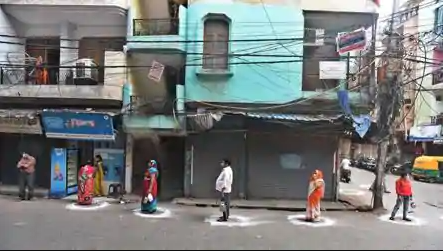Opinions

How PM’s power of exhortation is critical in the battle against Covid-19
Author - Baijayant ‘Jay’ Panda
Posted on - 27 March 2020
Image Source - Exhortation is a necessary, but not a sufficient condition. Strict enforcement is unavoidable. There will be other challenges, requiring the marshalling of enormous resources (Raj K Raj/HT PHOTO)
Downloadables
The ongoing 21-day national lockdown is unprecedented, though it could not have come as a surprise to those who had been watching how other countries responded to the coronavirus pandemic (Covid-19). India was quick to react to it, convening a crisis management group in early January.
Since then, beginning with the stoppage of flights from China in January, to screening of arriving international passengers, and quarantining, preventive measures have been gradually ratcheted up. This is as it should be. Any other way, say, imposing total lockdown a month earlier, would not only have been premature, but would have had a calamitous impact on the economy, far worse than the already serious current setback.
More importantly, such a drastic measure likely could not have been enforced before achieving a tipping point of acceptance among the populace. In fact, even now, there are stray examples of lack of compliance, even among the educated middle-class. This is why the rehearsal on March 22, the voluntary one-day “janata curfew” (people’s curfew) was a crucial prerequisite.
The eerie stillness all around the nation during the janata curfew was unprecedented. Social media was full of netizens’ posts, some with videos, about the only sounds heard all day being the long-forgotten chirping of birds. Except at 5pm, with millions thronging their doorsteps, balconies and windows to applaud the work of those in essential services with protracted clapping and clanging of utensils.
India has seen large-scale mass movements before, of course, but they have been political. From Mahatma Gandhi’s non-cooperation movement to Jayaprakash Narayan’s challenge to Indira Gandhi’s continuance, impassioned millions thronged the streets. And despite stated objectives to the contrary, violence invariably ensued.
But never before had India seen the buy-in, on such a grand scale, totally peacefully, of so many of its citizens for a social cause. Yes, there were a few who came out onto the streets in a misguided, celebratory mood. But they were a tiny fraction of those who joined in from their homes, in the true spirit of what was being attempted.
The reason this exercise was important has to do with democracy and State capacity. Authoritarian states like China can, and did, clamp down hard in enforcing social distancing. Of course, China bears culpability for suppressing information about the coronavirus in the initial weeks, to the extent of harassing and disciplining the first whistle-blower doctor. But in a first after decades, it demonstrated something heretofore unimaginable in the 21st century, that shutting down entire cities and provinces was not only conceivable but also doable.
Democracies find it harder to emulate that sort of brutal, top-down policymaking and enforcement. Examples abound in this particular crisis itself, with various democracies reacting at different speeds. All democracies, by definition, are burdened by slower decision-making than authoritarian ones. The ones that did take tough decisions faster did so, more likely, because of cultural attributes than any inherent systemic speed.
As the largest, most diverse democracy, India is no exception. In fact, over the seven decades in which it has been gradually rediscovering its historic relevance after centuries of slide, India has often been found wanting in State capacity on a variety of fronts. Unlike in China, therefore, no one, not even the most popular prime minister (PM) in decades, could simply snap his fingers and expect to successfully enforce a lockdown. Millions of argumentative Indians would have resisted, not for rational reasons, but due to long inculcated discomfort with diktats.Thus, democracies require leaders who excel at communicating with the masses, especially during crises. And that, unarguably, is this PM’s forte. Even leaving aside his ability to rally the electorate during campaigning — which has resulted in the biggest mandates in decades — there are plenty of other examples.
Narendra Modi’s messianic zeal in uniting millions for a social cause, simply by the power of exhortation, has been on display many times. His reigniting of the national consciousness towards public hygiene through the Swachh Bharat Mission was initially mocked by opponents. But six years down the line, it is widely acknowledged as having begun showing results. There is still a long way to go, but changes in attitudes are discernible.
Similarly, among many other examples, another one that stood out was the PM’s appeal to middle-class beneficiaries of subsidised cooking gas cylinders to voluntarily surrender them. Over 10 million Indians did so, enabling subsidies to be directed to the needy.
Nevertheless, to stop a pandemic in its tracks in a country like India, exhortation is a necessary but not sufficient precondition. Strict enforcement is unavoidable. Though large segments of the population are convinced of the need for social isolation, a few can still be seen violating the lockdown. Whether they are not yet convinced or are indisciplined, harsh enforcement of public health guidelines must be put in place.
As these weeks grind on, there will be many challenges. The marshalling of enormous resources will be required. The big package announced this week for the most economically vulnerable citizens is a crucial component. The government is surely working on more such measures. And yes, from time to time, exhortations from the top will continue to be needed.

